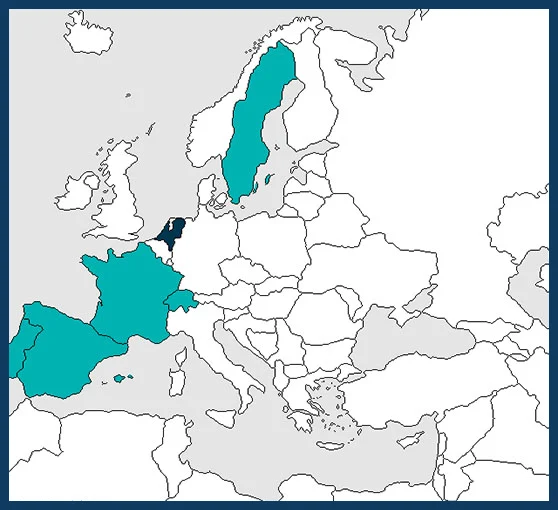01-2015 to 12-2017
€ 1 794 641
Prof. Lijbert Brussaard
lijbert.brussaard@wur.nl
Wageningen University, THE NETHERLANDS (Coordinator)
CNRS – Université Joseph Fourier, Grenoble, FRANCE
University of Coimbra, Department of zoology, PORTUGAL
University Rey Juan Carlos, Madrid, SPAIN Lund University, department of Biology, SWEDEN
Research Institute of Organic Agriculture FiBL, Frick, SWITZERLAND

The options of farmers to respond to rainfall variability differ between agro- ecological zones of Europe in terms of changing crop or cultivar choices, agricultural systems and soil management. A common, central element, however, is that the ways farmers can influence water infiltration and storage are closely related to how crop and residue management influence soil organic matter and, hence, carbon, nutrient and water loss or storage in soil and associated water and nutrient use efficiencies. In that sense, organic matter management is central in coping with increased variability of droughts and rainfall.
ECO-SERVE will evaluate current agricultural systems in agricultural landscapes for biodiversity-based options for adaptation to increased rainfall variability due to climate change. In this context, ECO-SERVE will evaluate alternatives to current agricultural systems that confer adaptation to the agro-ecological conditions that are changing in agricultural landscapes due to increased rainfall variability under climate change. Traits of crops, plant litter biota, rhizosphere biota and soil ecosystem engineers will be quantified, enabling ECO-SERVE to evaluate the performance of different agricultural systems in space and time in terms of carbon allocation and water and nutrient use efficiencies. Depending on whether water deficit or surplus situations will become more prevalent under climate change, management of soil organic matter for higher water-holding capacity versus water infiltration will be more important. By focusing on the (diversity of) relevant traits, trait combinations and trait attributes rather than (the diversity of) species of plants and soil organisms, the acquired knowledge will be generic, and ultimately applicable to different agro-ecological conditions in Europe.
A combination of factorial experiments and stakeholder interactions in selected agricultural landscapes (i.e. – arable agriculture, extensive grassland and sown grassland and agroforest in France, the Netherlands, Portugal, Spain, Sweden and Switzerland) is foreseen, with the aim to develop and test the project understanding of (combinations of) traits and trait attributes of plants and soil, as they are affected by, and affect soil organic matter properties, topsoil hydrology and associated water and nutrient use efficiencies.
Results will be interpreted in terms of general applicability and local limitations in similar and different agro-ecological areas in Europe than the ones studied.
Specific activities for dissemination of the project’s outputs and involvement of stakeholders / policy-makers will also be at the core of the project.
Stakeholder dialogue throughout the project will ensure that knowledge is communicated from stakeholders to the ongoing research as well as enabling research data to be adopted into implementing changes into management of production systems for improved sustainability. Discussion on the initial results will be engaged with farmers and other actors to identify possible synergies and trade-offs between ecosystem services considered important at the landscape level and, hence, which and to what extent adaptation strategies under climate change are feasible. Integration at the landscape level will take place through a scenario-building task with stakeholders, starting from the novel technical information obtained in the project, and leading to a variety of stakeholder- preferred management schemes, which will be evaluated in the project. In addition to regional stakeholder involvement, the implications of the project will be discussed with European-level stakeholders.